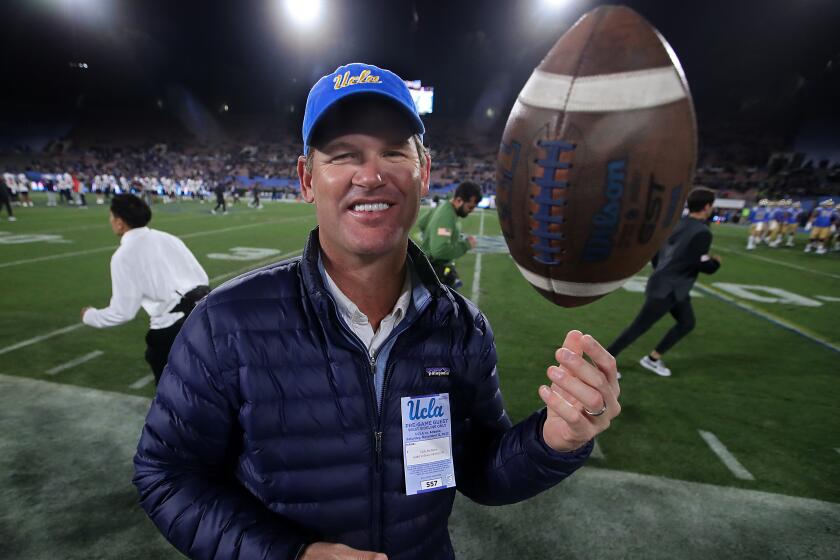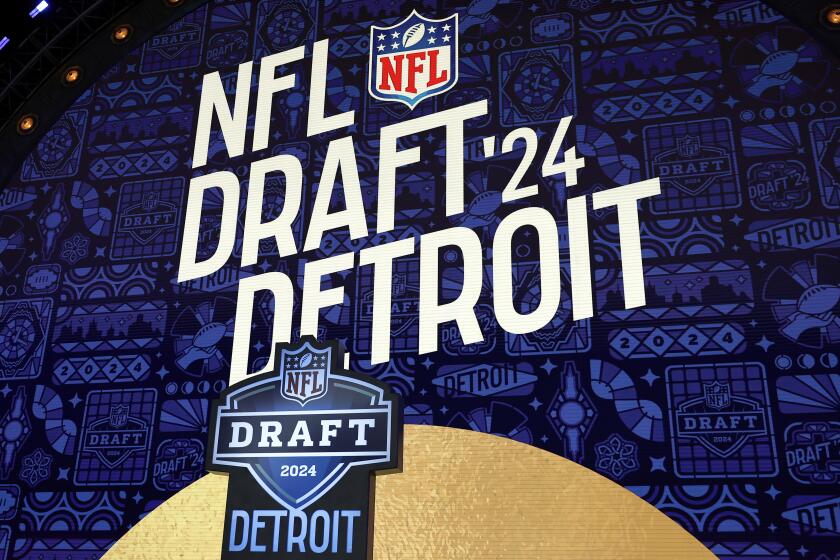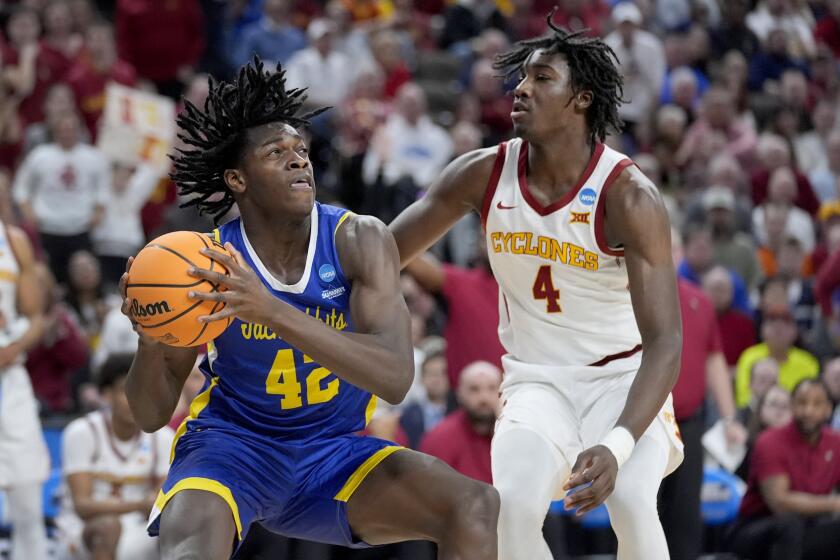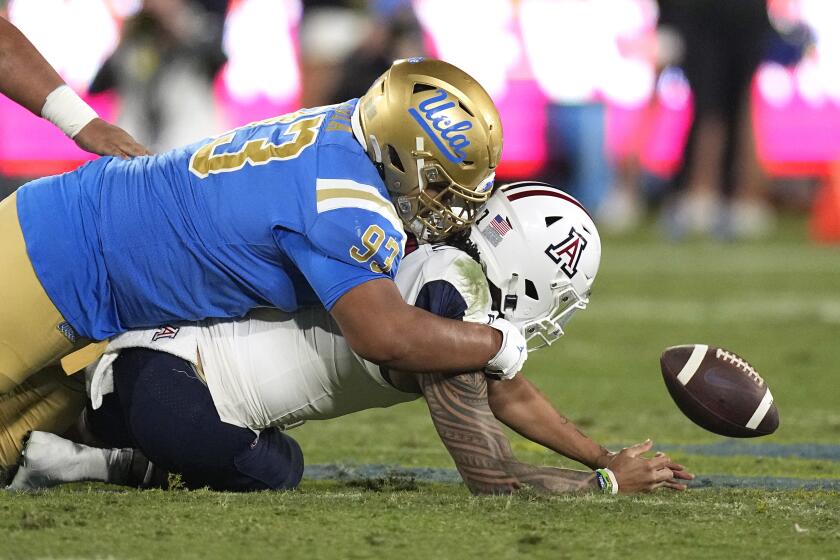Bruins seek elite status
The voice carried through a closed door from the bowels of Tennessee’s Neyland Stadium.
“We are going to get ourselves back to the pinnacle,” UCLA Coach Rick Neuheisel hollered after a 19-15 victory over the Volunteers two weeks ago.
The Back to the Future talk goes on, in the locker room and in cyber space, where UCLA fans see a 3-0 start as a prelude to the Bruins’ return to the national spotlight. The trick, if they make it, will be staying there.
The university’s academic standards, assistant coach turnover and a dug-in in-house Bruins family, as well as the presence across town of USC, are ingredients that have left UCLA with only one national championship -- handed out by an organization, United Press International, that no longer gives out titles.
This is the ninth time the Bruins are 3-0 entering Pacific 10 Conference play since 1971. Neuheisel remains cautious with a young team, but insists, “We do not want to be a middle-of-the-road program. We may have to go through that patch to get to where we want to go. We need to strive to excellence. It has happened here before. It can happen here again.”
Some teams climb mountains. UCLA, too often, has been stuck in the foothills. The Bruins have finished in the top 10 of the Associated Press poll 10 times in the last 53 seasons.
The Bruins’ lone national title was in 1954, when UPI voted the Bruins No. 1. They were second in the AP poll that year behind Ohio State. UCLA has spent a total of five weeks atop the AP poll since opening the 1955 season at No. 1.
“We had spurts in the 1960s and then [Coach] Tommy Prothro left when I really think we had the thing rolling,” former UCLA athletic director Peter Dalis said. “Dick Vermeil comes in and sparked things and we get to a Rose Bowl. Terry Donahue really grew the program in the 1980s, with all the bowl victories. Those are highlights from my perspective.”
Yet none had Bruins fans chanting, “We’re No. 1” in the end.
In 1967, UCLA was the top-ranked team heading into the USC game and lost, 21-20, on O.J. Simpson’s spectacular touchdown run. In 1988, Troy Aikman’s Bruins were No. 1 for two weeks, only to be upset by Washington State. The second-ranked Bruins, on a 20-game winning streak, were so close to playing for the 1998 national title they could smell it in the balmy South Beach breeze. Then they neglected to tackle Miami running back Edgerrin James and lost in the regular-season finale, 49-45.
Other programs have set the bar for the elite category. Florida State spent 14 seasons as a top-five team, from 1987 to 2000. Oklahoma never finished lower than seventh for a decade, from 1971 to 1980. Nebraska, Miami, Alabama and Ohio State all had lengthy runs in the top 10 since 1970. USC has finished in the top four the last seven seasons, winning two national titles.
When former USC coach John Robinson was told the Bruins had finished in the top 10 only 10 times in a half century, he said, “Wow, I didn’t know that.” He added, “I guess some of that was there wasn’t room for both teams. One team was always beating the other.”
USC has had 22 teams finish in the top 10 in the last 47 years, 16 of which were top-four teams, including five national champions.
“We got close to being an elite program in the mid-1980s,” Neuheisel said. “We went to three Rose Bowls in four years, plus a Fiesta Bowl. Troy Aikman came in and we had two 10-win seasons. I’d say between 1982-88 our football program was as good as any in the country.”
Miami won three national titles and was voted second two other times in that same era.
It leads Neuheisel to admit, “In terms of playing for national championships, we have never gotten on a roll that Ohio State, Florida and all those other programs did.”
Why not is a tricky question.
Donahue, who spent 20 seasons running the Bruins’ program, had more success than any coach other than Red Sanders, finishing in the AP top 10 five times. Asked what challenges he faced trying to sustain success at UCLA, Donahue joked, “That’s a long conversation.”
UCLA officials, even those retired, are skittish about pointing to academic standards. Dalis said, “I don’t want to go into that,” as it could be perceived as making excuses.
But the fact remains that top players such as wide receiver DeSean Jackson and running back Marshawn Lynch were unable to gain admission to UCLA, staff members have said. Both ended up at California and are now in the NFL.
“It comes down to recruiting significant players who can sustain the program,” Dalis said.
The turnover of assistant coaches, with the cost of living in Southern California, has been a concern.
“The more consistency with the staff makes things easier,” said Donahue, who kept most of his staff together through the 1980s. “Coaches have come to UCLA and really loved it, or didn’t like much of it at all from family standpoint. It’s different than in the Midwest and South. Coaches don’t live on campus here. . . . Families have to be more independent. Sometimes coming to practice is a chore rather than a joy.”
Neuheisel’s staff has strong Southern California ties. Three previously coached at UCLA and three others played at UCLA, giving them insight to the on-campus Bruins family, some of whom have been employed at the university for decades.
Coach Bob Toledo had that 20-game winning streak in the 1990s, but was fired when the Bruins ended the 2002 regular season by losing four of their last seven games. Toledo guided UCLA to back-to-back 10-2 seasons and appearances in the Cotton and Rose bowls after the 1997 and 1998 seasons. But he also alienated some old-guard Bruins, both in the department and among boosters. That made it harder to survive off-the-field embarrassments, such as quarterback Cade McNown’s using a handicap parking placard, running back DeShaun Foster’s suspension for receiving extra benefits and quarterback Cory Paus’ drunk driving conviction.
Said Neuheisel: “UCLA is a fabulous place and has a lot of people who have been here a long time. One of the things about football coaches is they can be paranoid. Information becomes so valuable that no one can be on the inside. People who should be inside are on the outside.”
Neuheisel said his advantage is “being a UCLA guy. If you have been a student, a player and an assistant coach here, you understand the fiber of what makes this place tick. You have to embrace that so no one ever asks, ‘What’s going on in the football program?’ They should already know. People here can help us. This is a very powerful place, witness the basketball program.”
Of course, the difference between basketball and football at UCLA is one of national standing.
“We haven’t done that,” Neuheisel said, “but that’s where I want to go.”
--
twitter.com/cfosterlatimes
Go beyond the scoreboard
Get the latest on L.A.'s teams in the daily Sports Report newsletter.
You may occasionally receive promotional content from the Los Angeles Times.




